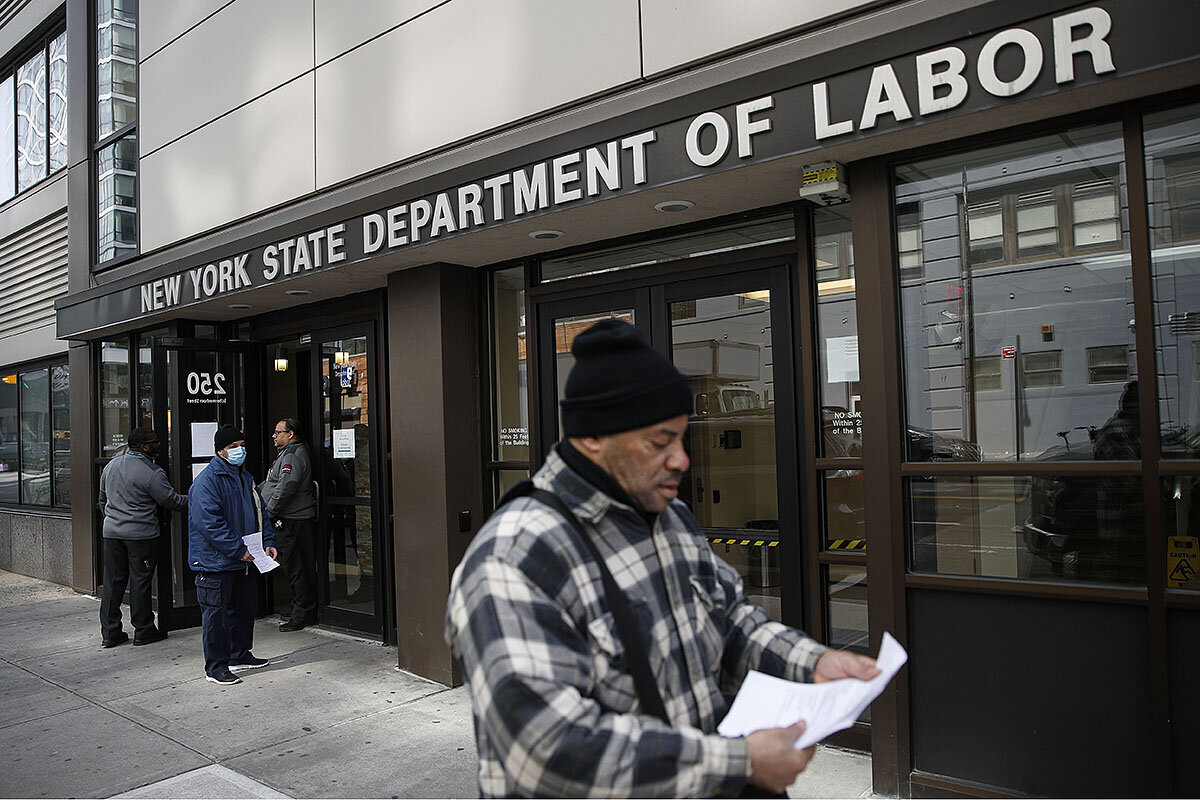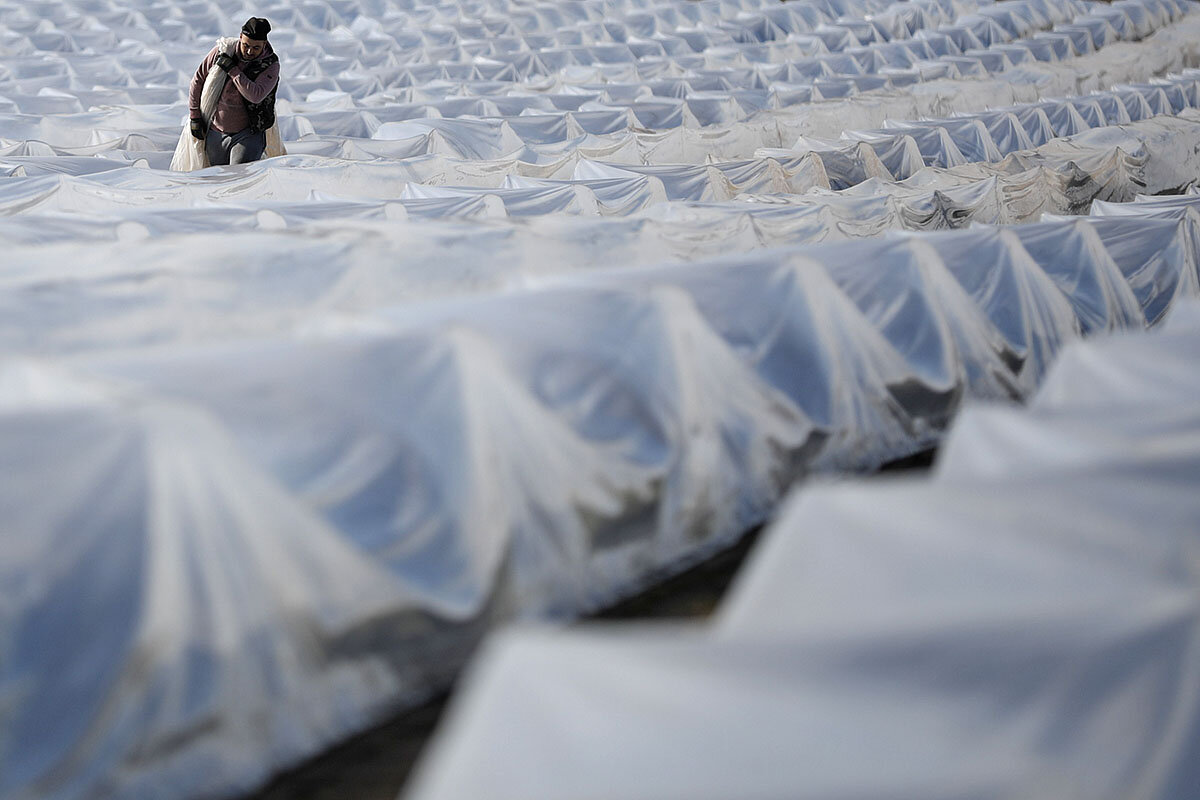From Milan to Miami, locked-in nations try to soften an economic blow
Loading...
| Washington, Berlin, and Mexico City
It’s a seemingly intractable dilemma, suddenly as salient in Berlin or Tokyo as it is in Washington: How do you save people’s economic livelihoods while telling those same people to stay home?
A global recession, many forecasters say, is already here and is growing more severe by the day, as millions of consumers and workers in Europe, Asia, and North America have been sidelined as governments take extreme measures to stem the COVID-19 pandemic.
Finally, though, actions by governments and central banks appear to be ramping up, not so much in an effort to prevent a recession as simply to weather a storm that could easily become more severe than the global financial crisis a decade ago.
Why We Wrote This
Turmoil in financial markets reflects widespread fears over a global recession amid the coronavirus pandemic. How policymakers respond could be critical to the length and depth of such a recession.
Help can’t come soon enough for Dominik Wilkinson and his co-workers at a restaurant in the northern German town of Bielefeld. The restaurant’s 40 staff members are already working sharply reduced hours, and there’s talk in town of curfews starting Friday. A prolonged closure would be, “death, in terms of revenue. It’s basically the same for every small and medium-sized company,” says Mr. Wilkinson, a shift manager.
[Editor’s note: As a public service, all our coronavirus coverage is free. No paywall.]
In the United States, the past few days have seen automakers mothball factories, hotel chains furlough tens of thousands of workers, and major retailers trim store hours or go online only. A Labor Department report today showed claims for unemployment benefits spiking to 281,000 last week. Every day brings more turmoil in global stock and bond markets as investors seek safe havens, even as central banks cough up amounts not seen since the financial meltdown of 2008.
Yet the situation’s very severity is spurring governments into action. Relief measures range from mortgage or tax holidays to cash infusions for households, while also lending or simply giving money to businesses to prevent mass layoffs or permanent closures.
Analysts say these are precisely the kinds of measures that can help, but their effectiveness will hinge greatly on their magnitude and speed of delivery. And what makes this crisis different, they add, is that a pandemic must also be tamed because the economic and health crises are intertwined.
The Group of Seven international economic organization has already issued a “whatever it takes” statement of determination. The International Monetary Fund and World Bank are . But so far it’s an open question whether global leadership today can match the kind of concerted effort that emerged from the depths of the 2008 crisis.
“A lot of people didn’t quite measure the gravity of the situation for a while, including myself to be honest,” says Ioana Marinescu, an economist at the University of Pennsylvania in Philadelphia. “We have to think about supporting business. That’s very important because if we allow businesses to fail, we are losing jobs. ... We’re also losing capital.”
Economic side effects
The top priority remains a pandemic that has killed more than 9,000 people and spread to every continent except Antarctica. Yet, if the economic side effects are left unaddressed, the result would be significant human hardship of another kind. It is costly to rehire workers, let alone to start new businesses from scratch. And the more workers lose jobs and paychecks now, the sharper the downward spiral.
So in the U.S., members of Congress are considering emergency relief for the economy that could surpass $1 trillion in value, of which about half may be cash handouts to families that can be spent as quickly as possible. But in parallel, the Trump administration wants to bail out airlines and other hard-hit industries, and offer loans to help small businesses cope.
Other steps around the world include emergency loans in China and Japan, unemployment benefits for French workers forced into part-time status, and to halt evictions by landlords during the pandemic.
In Washington, a sense of urgency has blunted partisan edges, at least in part. On Wednesday, Republican Senate Majority Leader Mitch McConnell successfully urged his colleagues to approve a measure, crafted by Democrats in the House, to expand unemployment benefits and paid sick leave, and to make tests for the coronavirus free.
“More than usually, this touches many, many, many actors and not just the most vulnerable. So I think that’s a reason to go broad” with emergency support, says Dr. Marinescu. “It’s like we’re firefighting – first dropping water on the whole building,” then thinking about more targeted relief going forward.
Last week, Germany green-lit a host of fiscal measures to offset the pandemic crunch. Companies large and small can access increased credit, apply for funds to pay idled workers, and seek tax deferrals.
But Katja Sator, owner of a precision engineering company in the southwest state of Baden-Württemberg, worries the emergency aid only amounts to a “mound of debt,” whereas grants wouldn’t weigh down her balance sheet.
“It’s great that we’re receiving help with liquidity and that we can get new credit,” says Ms. Sator, whose company, Frankenstein Präzision GmBH, makes precision parts for automakers and other industries. “But we have to pay everything back. That means it’s not clear whether we’ll be in the red for the year if we have to close down production.”
She hasn’t laid anyone off, but she’s not extending temporary contracts. Her production lines are still running, with technicians spaced 2 meters (6 1/2 feet) apart.
Limits to monetary policy
As markets react to the pandemic, central banks have in many cases acted faster since they are inherently nimbler than legislatures. But unlike in 2008, when the crisis began in an over-leveraged financial sector, the coronavirus has slammed into the real economy, which monetary policy alone is hard-pressed to rescue.
On Tuesday, the U.S. Federal Reserve reopened two programs last used during the global financial crisis a decade ago, to keep the from clogging.
And on Wednesday, European Central Bank President Christine LaGarde cited “no limits” to as the bank launched an $820 billion program to buy government and corporate debt.
For all the actions underway, the question economists raise is what will be enough in these extraordinary times. Forecasting the depth of the slowdown is challenging; recent estimates suggest up to a 14% drop in U.S. economic output (annualized) in the second quarter.
Although the term “fiscal stimulus” often is used for recession-fighting programs, the goal today is really about helping individuals and businesses survive this economic stallout. A rebound will come later. The challenge is to contain the current damage by slowing the spread of COVID-19 while minimizing job losses and firm closures.
“Right now what needs to happen is flattening the curve [of the outbreak] while still doing whatever it takes ... to keep the fabric of the economy and of society alive,” says Fabio Ghironi, an economist at the University of Washington in Seattle.
That means economic rescue should include support for stretched health care systems, he says – something far different from recessions with purely economic causes.
The U.S. and other governments are making some big efforts, but Dr. Ghironi argue much more will be needed.
Mangoes for sale
Many less-developed economies face an especially hard time finding the resources for both a public-health crisis and an economic one.
In Mexico City, Julio Bisrreal Alcantaria stands beneath a lush green tree on the sidewalk beside his fruit truck slicing mangoes and papayas. He hasn’t seen much of a slowdown in business due to the coronavirus, he says, but expects nationwide school closures starting this week to hit his business hard.
“I can make it about two weeks with slow sales, and then I’m in trouble,” he says. “If kids aren’t in school and people aren’t going to their offices, I have no one to sell to.”
Mr. Bisrreal is one of the estimated 30 million Mexicans working in the informal economy – without social security or job protections. As with gig economy workers in the U.S., flexibility becomes moot if a pandemic forces people indoors and consumer spending evaporates.
Mexico’s finance ministry has proposed lines of credit, debt refinancing, and helping small businesses stay afloat. But “there’s no real discussion” in the legislature about economic stimulus, says Valeria Moy, an economist at Mexico ¿Como Vamos?, a think tank.
School closings aside, President Andrés Manuel López Obrador has resisted an economywide lockdown, arguing that it would hurt poor people. There are “pressures of all types. Close the airport, shut down everything, paralyze the economy. No,” he told a press conference.
Workers scramble for a foothold
Worldwide, the stakes are high. In Odemira, Portugal, Domingos Vicente owns a fruit distribution business with 40 employees, mostly migrants.
“If my business shuts down, I won’t be able to pay them to stay at home not working, and they will not stay around, which means it will be hard to start over again once it’s possible and hire new workers. That means trouble for the agricultural supply in Portugal.”
In Italy, the nation hardest hit in Europe by the virus, the government is helping employers meet their payrolls and freezing loan and mortgage payments for many who are affected by the crisis.
But as in other nations, the emergency programs take time to reach people and may not be enough. That’s especially true for workers in the gig economy like Claudia Bellante, a freelance journalist in Milan. Her husband, a photographer, has seen his work dry up. He’ll be eligible for some emergency grants, but she won’t.
“I understand these are emergency measures for this time, but I worry when the pandemic ends we’re going to be in a very difficult place,” Ms. Bellante says. “I doubt there will be enough money for everyone.”
Dr. Ghironi, the Italian-born economist at the University of Washington, says South Korea has shown how to fight the pandemic without economy-debilitating lockdowns by using prompt testing and infection tracing. Whatever steps work, he says the public-health approach and economic rescue go hand in hand.
“We need the resources and the stimulus to be injected, while the [public health] pieces of the mechanism are put in place, so the lockdown can be lifted as soon as possible.”
Lenora Chu in Berlin, Whitney Eulich in Mexico City, and Catarina Fernandes Martins in Castelo Branco, Portugal, contributed to this article.
[Editor’s note: As a public service, all our coronavirus coverage is free. There is no paywall.]










